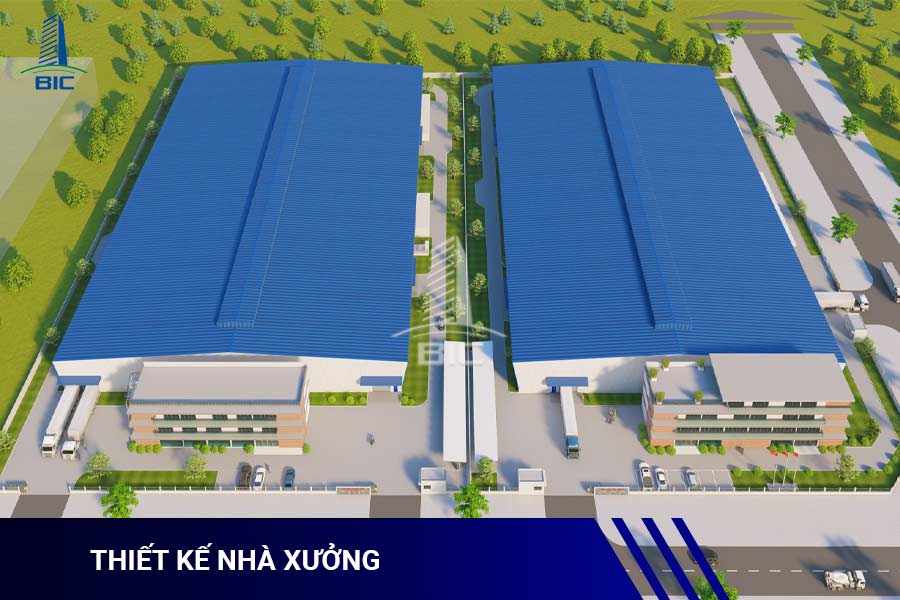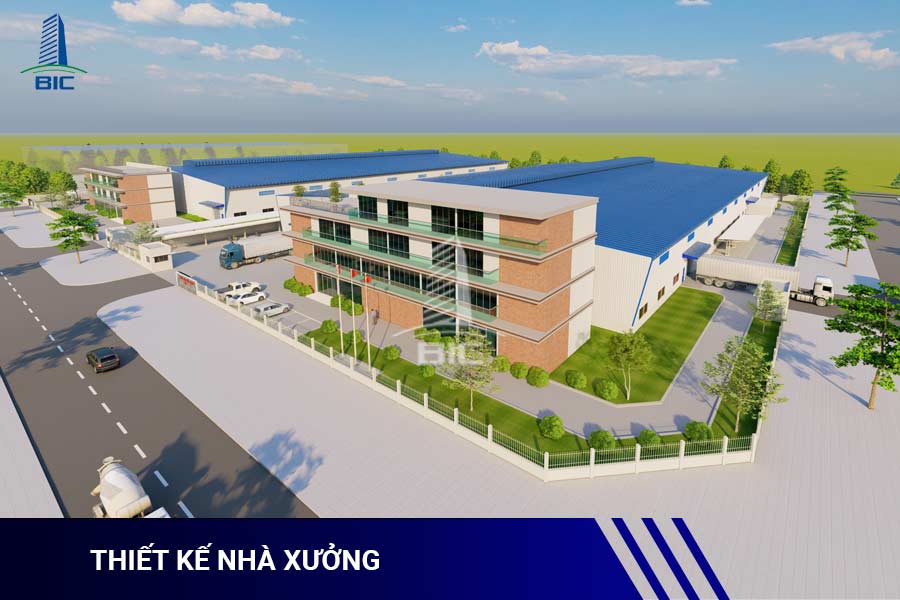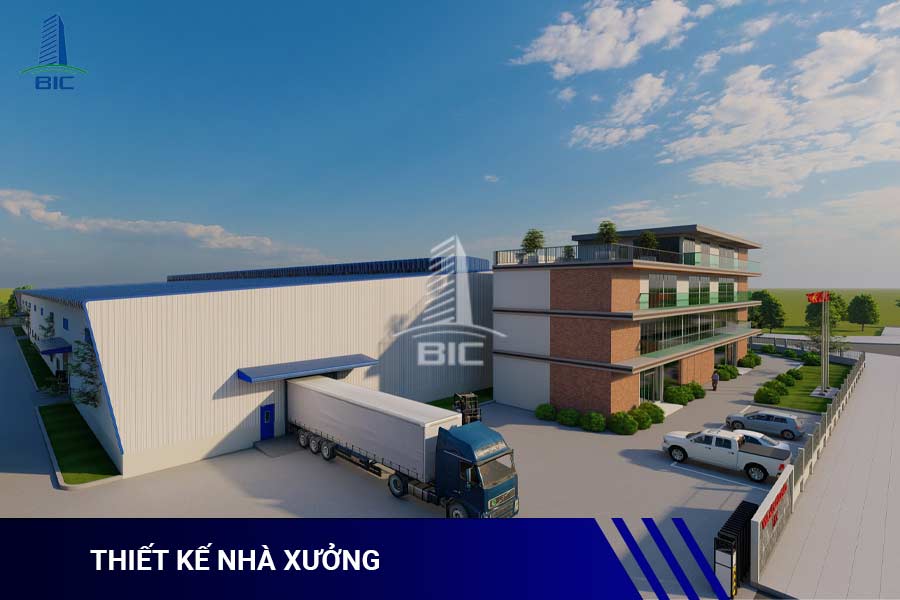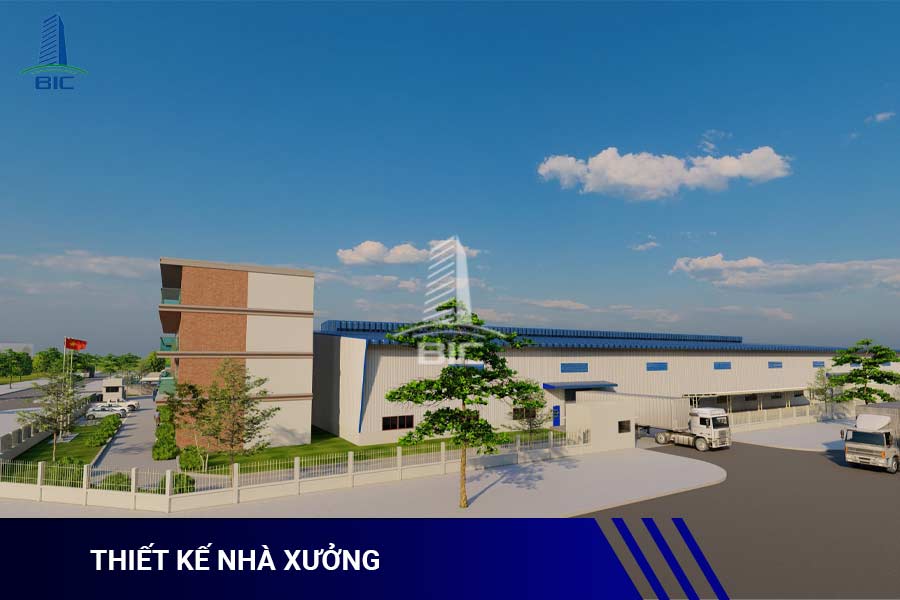
Factory design is not simply about creating a production space but also a process of complying with a series of strict regulations and requirements. Every drawing, every detail must meet standards to ensure that the project is not only durable but also legal and safe throughout its operation. So, what are the essential regulations businesses must comply with when starting factory design?
In reality, many businesses face delays or have to adjust their construction plans because they are not fully aware of the necessary standards. Quite a few projects are suspended or encounter difficulties in obtaining operational permits due to incomplete legal and design documentation. This is exactly why thoroughly understanding the standards before implementation is mandatory and must not be overlooked.
With experience in accompanying hundreds of industrial projects, BIC always prioritizes standards and regulations in every factory design. This not only ensures that businesses own a legally compliant facility but also guarantees stability, safety, and long-term efficiency. So, what specific standards and regulations should be considered? Let’s explore them in detail with BIC below.
A factory design only holds real value when it complies with standards and legal regulations. These are not merely formal procedures but serve as the foundation for safe, long-term, and economically effective operation. When standards are incorporated from the design stage, every step of construction, inspection, and commissioning proceeds smoothly, minimizing risks.
Compliance with standards also helps protect the business’s reputation. A factory that fails to meet requirements can lead to technical failures, disrupt production, and even threaten worker safety. On the other hand, a design that adheres to proper regulations builds trust with partners, customers, and authorities. This is a crucial factor for businesses to expand production and achieve sustainable growth in today’s highly competitive market.
In fact, many projects have been halted midway simply because they failed to meet legal or technical requirements. The losses in time and cost in such cases are often significant, even impacting the business plans of entire supply chains. For this reason, BIC regards compliance with standards not only as a professional responsibility but also as a commitment to delivering comprehensive, safe, and legal factory design solutions for clients.

When designing factories, applying the right construction standards is critical to ensure safety, efficiency, and legal compliance. These standards cover the entire process, from planning and architecture to structural design and technical systems.
Proper planning is the foundation for efficient factory operations. The facilities within the site must be arranged logically, ensuring safety distances and convenient movement. Factory architecture must consider construction density, height, usable floor area, walkways, and emergency exits. Lighting and ventilation are also essential, not only for improving productivity but also for safeguarding workers’ health.
Industrial factories usually bear heavy loads from machinery, raw materials, and production activities. Therefore, structural design must comply with regulations on the load-bearing capacity of reinforced concrete and steel structures. Calculations for wind, rain, earthquakes, and other external impacts are mandatory to ensure stability and durability.

Fire and explosion safety is always the top priority in factory design. The design must meet requirements for fire detection systems, fire suppression, emergency exits, and water storage tanks. Sufficient spacing between production zones must be maintained to minimize the risk of spreading in case of incidents. Compliance with fire protection standards is not only a legal obligation but also directly protects workers’ lives and company assets.
Electrical, water supply and drainage, lighting, and ventilation systems are vital for operations. These systems must be designed to ensure safety, energy efficiency, and adequate plant capacity. Standards on electrical leakage protection, stormwater drainage, wastewater treatment, and maintaining a comfortable working environment must all be strictly applied.
A compliant factory must not only have a stable structure but also be environmentally friendly and protect worker health. Requirements for noise control, air quality, lighting, and working temperatures must be addressed in the design. Additionally, machine operating areas and worker pathways should be arranged appropriately to prevent workplace accidents.

Alongside technical standards, factory designs must also comply with all legal regulations issued by government authorities. This is a prerequisite for obtaining construction permits and legal operation.
First, businesses need to prepare the required legal documents, including the land use rights certificate, construction permit, fire protection approval, and environmental impact assessment report. Each document is tied to a specific legal requirement: land must be zoned for industrial use, designs must be approved, fire protection systems must meet standards, and operations must not negatively impact the surrounding environment.
The approval process for design documents and permit applications is clearly regulated. Businesses must submit documents to relevant authorities such as the Department of Construction, Fire Prevention Police, Department of Natural Resources and Environment, or Industrial Zone Management Board. These authorities will review and verify the documents against current regulations before issuing approval. Only when the documents are valid can the project move forward.
Compliance with legal regulations not only prevents the risk of suspension or fines but also ensures transparency and credibility in investment activities. A legally built factory will find it easier to expand production, attract investment, or secure long-term contracts with partners.
.jpg)
Compliance with standards and regulations in factory design is not only mandatory but also directly impacts investment effectiveness and operations. Neglecting these requirements from the start may expose businesses to legal risks, extra costs, or production interruptions.
One important note is to always stay updated with the latest standards. TCVN and QCVN systems are regularly revised to reflect real-world conditions and technological advancements. Applying outdated standards can result in required revisions by authorities, delaying the approval process. Therefore, keeping up with standard updates is essential to maintain valid documentation.
Moreover, many businesses today aim not only at the domestic market but also at global supply chains. In such cases, combining Vietnamese standards with international standards like LEED, EDGE, or ISO provides a competitive edge. Factories designed to international standards not only save energy and promote sustainability but also enhance brand reputation and gain trust from international partners.
Another critical note is selecting a competent and experienced design unit. In reality, small mistakes in applying standards or missing legal documents can cost far more than the initial design fees. A reputable unit ensures that all standards and regulations are properly applied from the outset and supports businesses in responding quickly when authorities require verification.
All these factors demonstrate that applying standards and regulations in factory design cannot be done superficially. It is the foundation for businesses to own a sustainable, legal facility capable of meeting long-term production needs.

Complying with standards and regulations in factory design requires in-depth knowledge of engineering, law, and planning. Not all businesses have the resources to handle these requirements independently. Partnering with a professional factory design company offers many practical benefits.
Professional design firms are well-versed in construction standards, from planning and architecture to structural design, technical systems, and environmental safety. As a result, the designs they deliver comply with regulations, avoiding mistakes that may lead to rejections or multiple revisions. This helps businesses save significant time and effort during the preparation stage.
A standardized design not only ensures legal compliance but also optimizes costs. A logically arranged factory reduces space wastage, saves construction materials, and shortens the building schedule. During operations, solutions for ventilation, lighting, and modern technical systems help cut energy costs and improve production efficiency.
Professional firms often have experience working directly with government authorities. They understand the processes of obtaining construction permits, fire protection approvals, and environmental clearances, thereby supporting businesses in preparing complete, valid documentation from the start. This shortens processing times and reduces legal risks during project implementation.
Throughout construction, the design unit can work alongside contractors to monitor project quality. They ensure that construction strictly follows the approved design, avoiding unreasonable changes or unauthorized building. This helps the project finish on schedule, enabling early operations and meeting business plans.
Factory design is not only a technical task but also a process of strictly adhering to standards and legal regulations. A project can only operate sustainably, safely, and legally if designed based on proper standards from the outset. The more businesses understand and correctly apply these requirements, the more they minimize legal risks, save costs, and optimize long-term operational efficiency.
With extensive practical experience in industrial projects, BIC provides comprehensive factory design solutions, ensuring compliance with regulations while meeting the unique production needs of each business. By partnering with BIC, investors gain not only a safe and legal facility but also a solid foundation for sustainable growth in the future.